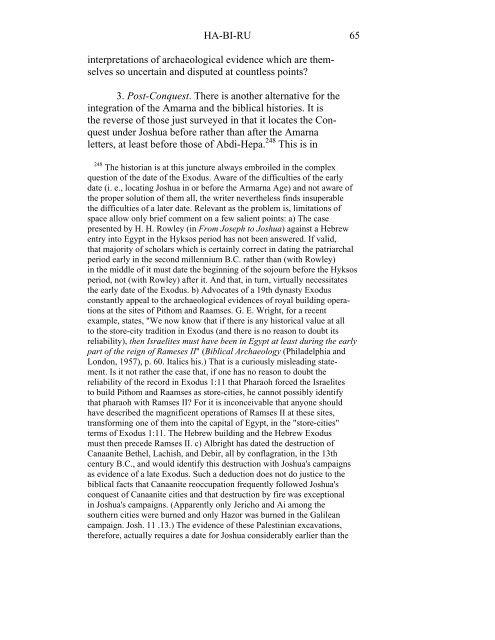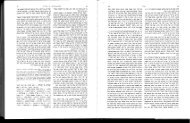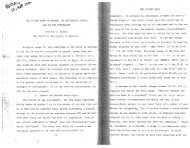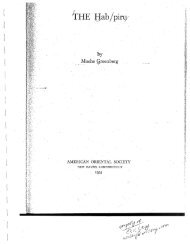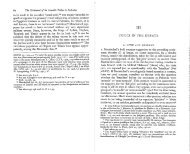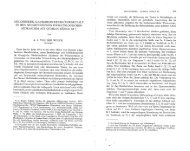The Ha-Bi-Ru--Kin or Foe of Israel? - Gordon College Faculty
The Ha-Bi-Ru--Kin or Foe of Israel? - Gordon College Faculty
The Ha-Bi-Ru--Kin or Foe of Israel? - Gordon College Faculty
Create successful ePaper yourself
Turn your PDF publications into a flip-book with our unique Google optimized e-Paper software.
HA-BI-RU 65<br />
interpretations <strong>of</strong> archaeological evidence which are them-<br />
selves so uncertain and disputed at countless points?<br />
3. Post-Conquest. <strong>The</strong>re is another alternative f<strong>or</strong> the<br />
integration <strong>of</strong> the Amarna and the biblical hist<strong>or</strong>ies. It is<br />
the reverse <strong>of</strong> those just surveyed in that it locates the Con-<br />
quest under Joshua bef<strong>or</strong>e rather than after the Amarna<br />
letters, at least bef<strong>or</strong>e those <strong>of</strong> Abdi-Hepa. 248 This is in<br />
248 <strong>The</strong> hist<strong>or</strong>ian is at this juncture always embroiled in the complex<br />
question <strong>of</strong> the date <strong>of</strong> the Exodus. Aware <strong>of</strong> the difficulties <strong>of</strong> the early<br />
date (i. e., locating Joshua in <strong>or</strong> bef<strong>or</strong>e the Armarna Age) and not aware <strong>of</strong><br />
the proper solution <strong>of</strong> them all, the writer nevertheless finds insuperable<br />
the difficulties <strong>of</strong> a later date. Relevant as the problem is, limitations <strong>of</strong><br />
space allow only brief comment on a few salient points: a) <strong>The</strong> case<br />
presented by H. H. Rowley (in From Joseph to Joshua) against a Hebrew<br />
entry into Egypt in the Hyksos period has not been answered. If valid,<br />
that maj<strong>or</strong>ity <strong>of</strong> scholars which is certainly c<strong>or</strong>rect in dating the patriarchal<br />
period early in the second millennium B.C. rather than (with Rowley)<br />
in the middle <strong>of</strong> it must date the beginning <strong>of</strong> the sojourn bef<strong>or</strong>e the Hyksos<br />
period, not (with Rowley) after it. And that, in turn, virtually necessitates<br />
the early date <strong>of</strong> the Exodus. b) Advocates <strong>of</strong> a 19th dynasty Exodus<br />
constantly appeal to the archaeological evidences <strong>of</strong> royal building opera-<br />
tions at the sites <strong>of</strong> Pithom and Raamses. G. E. Wright, f<strong>or</strong> a recent<br />
example, states, "We now know that if there is any hist<strong>or</strong>ical value at all<br />
to the st<strong>or</strong>e-city tradition in Exodus (and there is no reason to doubt its<br />
reliability), then <strong>Israel</strong>ites must have been in Egypt at least during the early<br />
part <strong>of</strong> the reign <strong>of</strong> Rameses II" (<strong>Bi</strong>blical Archaeology (Philadelphia and<br />
London, 1957), p. 60. Italics his.) That is a curiously misleading state-<br />
ment. Is it not rather the case that, if one has no reason to doubt the<br />
reliability <strong>of</strong> the rec<strong>or</strong>d in Exodus 1:11 that Pharaoh f<strong>or</strong>ced the <strong>Israel</strong>ites<br />
to build Pithom and Raamses as st<strong>or</strong>e-cities, he cannot possibly identify<br />
that pharaoh with Ramses II? F<strong>or</strong> it is inconceivable that anyone should<br />
have described the magnificent operations <strong>of</strong> Ramses II at these sites,<br />
transf<strong>or</strong>ming one <strong>of</strong> them into the capital <strong>of</strong> Egypt, in the "st<strong>or</strong>e-cities"<br />
terms <strong>of</strong> Exodus 1:11. <strong>The</strong> Hebrew building and the Hebrew Exodus<br />
must then precede Ramses II. c) Albright has dated the destruction <strong>of</strong><br />
Canaanite Bethel, Lachish, and Debir, all by conflagration, in the 13th<br />
century B.C., and would identify this destruction with Joshua's campaigns<br />
as evidence <strong>of</strong> a late Exodus. Such a deduction does not do justice to the<br />
biblical facts that Canaanite reoccupation frequently followed Joshua's<br />
conquest <strong>of</strong> Canaanite cities and that destruction by fire was exceptional<br />
in Joshua's campaigns. (Apparently only Jericho and Ai among the<br />
southern cities were burned and only <strong>Ha</strong>z<strong>or</strong> was burned in the Galilean<br />
campaign. Josh. 11 .13.) <strong>The</strong> evidence <strong>of</strong> these Palestinian excavations,<br />
theref<strong>or</strong>e, actually requires a date f<strong>or</strong> Joshua considerably earlier than the


